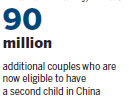Amended policy yields increase in demand for services
Updated: 2016-07-12 08:03
By Wang Xiaodong(China Daily)
|
|||||||||
With the adoption of the universal second-child policy, the number of couples seeking assisted reproductive technologies is rising rapidly in China.
"Last year, we completed about 60 artificial insemination procedures in the hospital, but the number was more than 100 in the first half of this year," said Zhang Jun, head of operations at Beijing Bao Dao Healthcare, a high-end maternity hospital in Beijing.
Having obtained the permission of the health authorities in Beijing, the hospital began offering in vitro fertilization services at the start of the year to meet the rising demand from couples who find it difficult to conceive naturally.
It is approved for only 50 IVF procedures in the first year, and the quota is likely to be exhausted long before December, Zhang said.

Most of the couples who opt for assisted reproductive technology at the hospital are age 35 and older, and most of them want a second child because they lost their firstborn or they have married a second time and want to start a new family, she said.
Since the beginning of the year, all couples have been eligible to have two children, under the revised family planning law.
That means an additional 90 million couples are now eligible to have a second child, but about 50 percent of the women are age 40 or older, which means they face more risks and have less chance of becoming pregnant, according to the National Health and Family Planning Commission.
With the new policy, IVF clinics in big hospitals across the country have seen an upsurge in patient numbers, and some have reported a doubling in the number of requests for clinical advice since last year, according to media reports.
Yu Haibo, a marketing manager for Yijiayi, a company in Beijing that provides advice about assisted reproductive services, said most of her clients are age 40 or older, and some are older than 50.
Most of them have attempted to conceive many times, but repeated failure has motivated them to travel overseas in search of successful pregnancies, she said.
Yu said a large number of couples may still be able to conceive naturally, so what they require is patience, not assisted reproductive technology.
(China Daily 07/12/2016 page6)
Today's Top News
Theresa May set to be UK's next PM after rival quits
Chinese participation at UK air show biggest ever
2 gored in bull run; bullfighter killed
G20 economies to improve global trade governance
Suspect in Dallas attack wanted to 'kill white people'
5 Dallas police killed at protest against police shooting
Ministry slams US-Korean THAAD deployment
Shoring up support
Hot Topics
Lunar probe , China growth forecasts, Emission rules get tougher, China seen through 'colored lens', International board,
Editor's Picks

|

|

|

|

|

|







